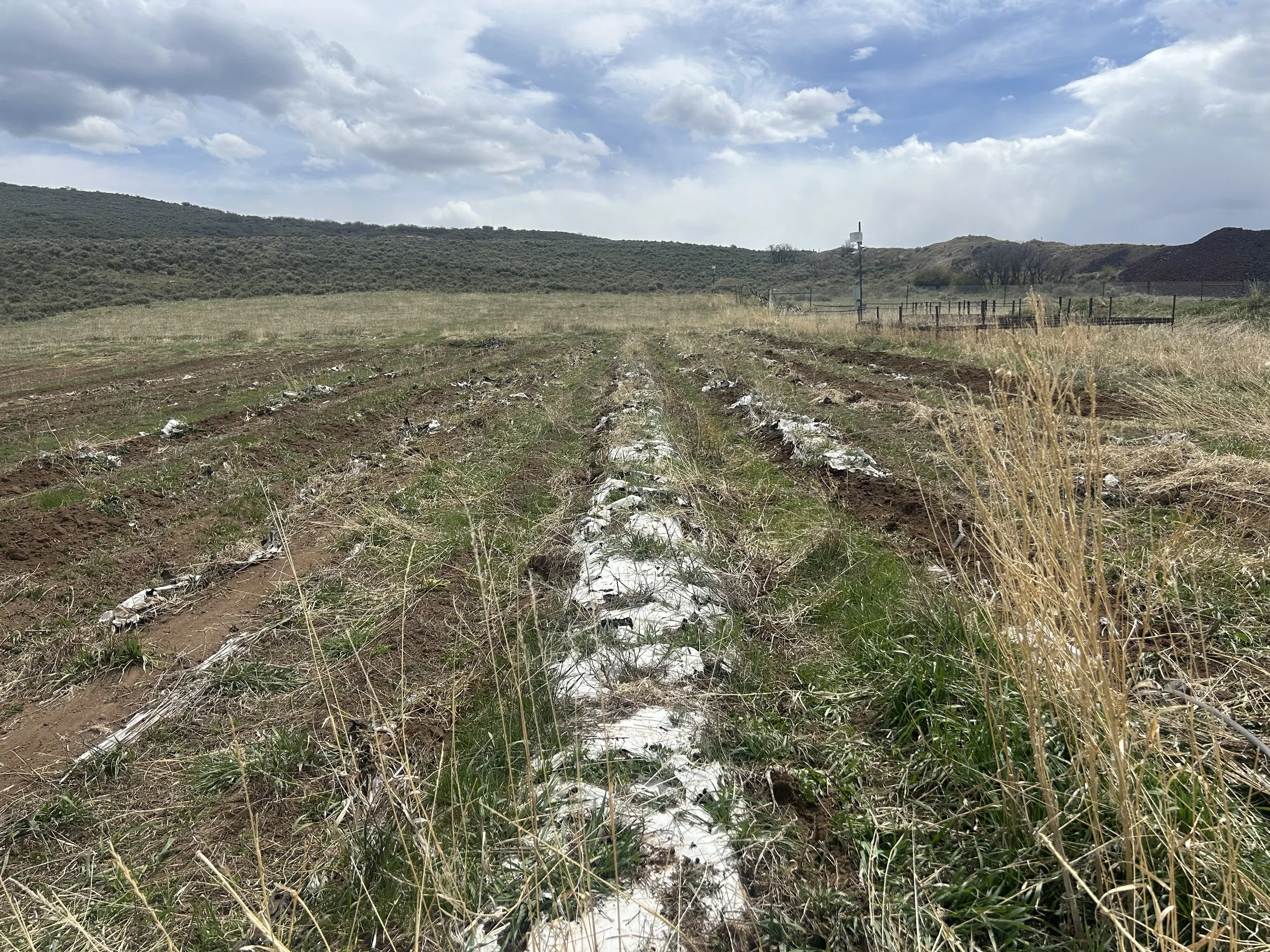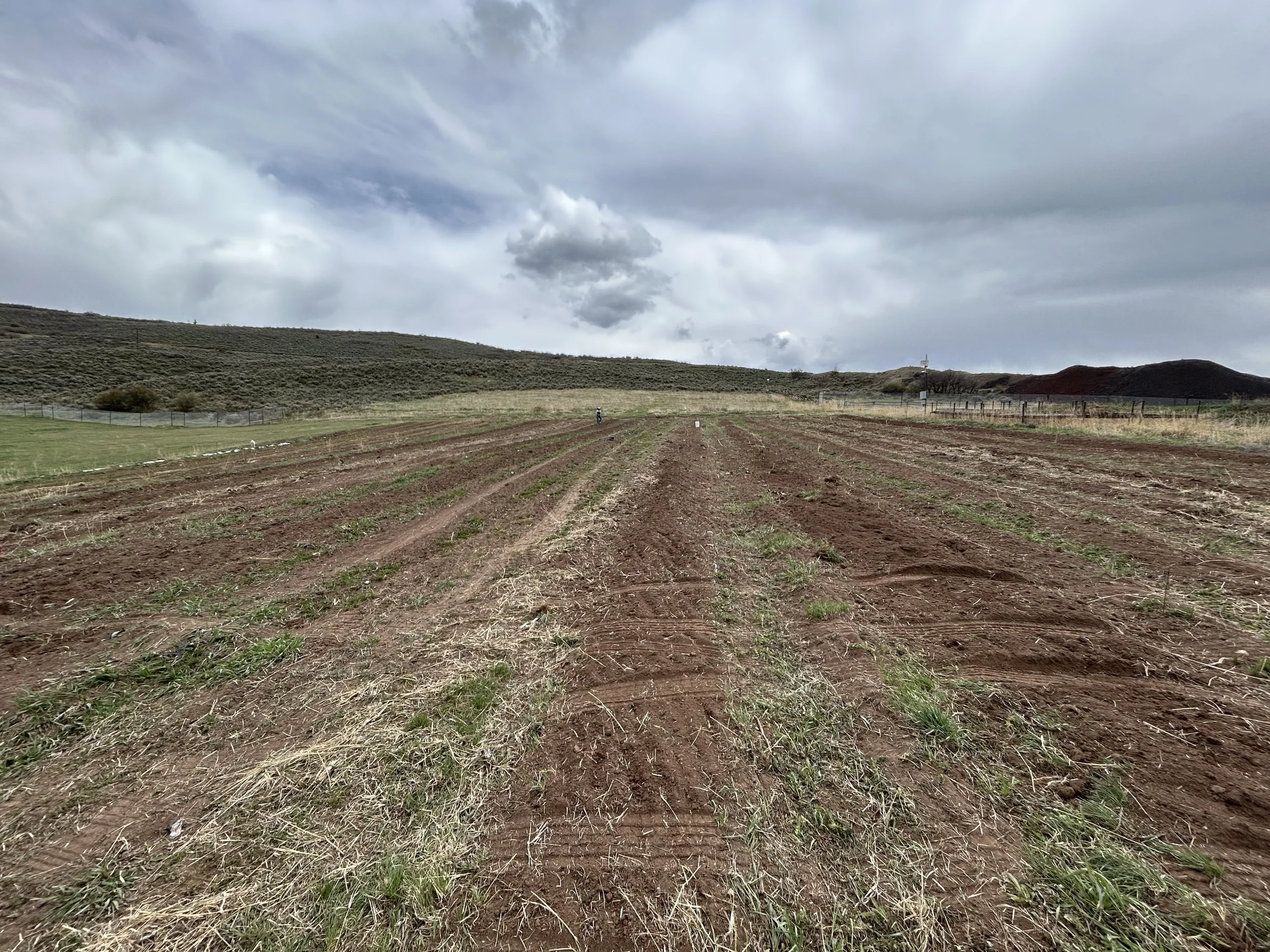Weeds, Plastic, and Spreadsheets: Clearing the Field (and Our Heads)
007. Seven Acres of Plastic Mulch and One Small Mental Breakdown
Cooper opened up ONX and zoomed in onto our property. He drew a line zigzagging around the irregularly shaped area that, in the satellite aerial view, is lined with rows of plastic. Seven acres, it said his border enveloped, of plastic row cover.
What the satellite image doesn't capture is the degradation of said plastic that's happened over the years since Google took a pic of our land. Some of the plastic is white, some of it black, and all of it is falling into shreds.
The Plastic Problem
Field lined with degraded black and white plastic mulch
Earlier this spring, after the snow had melted and as all the grass was starting to green up and begin to grow anew, we embarked on the task of getting this plastic out of the field. The plastic row cover aka plastic mulch is, as it's commonly installed, rolled out onto a raised or unraised bed with dirt folded over its edges to hold it down. This is a fine method if you remove the plastic while it still has enough integrity to be yanked out of the soil in one piece.
You guessed it: This plastic has the integrity of an insecure, people-pleasing executive who doesn't understand the product their team is in charge of selling -- that is, not much.
(Did you forget this blog is about the metaphorical shit shoveling too?)
Trial and Error (and Tractor Attachments)
So we toyed with ideas for methods: How about dragging a chain rake over it with the tractor? How about scooping it all up, dirt and all, into a pile and toting truckload after truckload to the landfill? How about waiting for rain and then pulling it up with our hands?
Going it by hand was quickly discouraging. We worked for 15 minutes and got about halfway down a row. We did the math on that: How about spending seven nine-hour days bent over these rows wrestling plastic out of the ground? Rather not?...
We decided to borrow an undercutter bar which is basically a giant hula hoe that you pull behind a tractor. Cooper did so, followed by pulling a hay rake, which looks like a bunch of giant frozen spaghetti that spins in circles in such a way that gathers a twelve-foot-wide strip of detritus into a cute two-foot-wide mounded strip.
With the generous help of Cooper's parents, we followed the undercutting and the raking with a trailer and pitchforked the dried-weed-and-plastic cocktail right in. Our lower backs got worked, but we kept our spirits high and got through about an acre in a day.
It was hugely satisfying to see the before and after: a field of dirt, and a truckload of plastic that now wouldn't be breaking down in our soil for thousands of years to come.
But spring was coming in hot, and we didn't know how we'd pull off six more days like this, twelve with no help and assuming the rest of the fields would respond similarly to our methods, alongside full-time jobs and a farm to run, complete with plants and animals that depend on us for, you know, being alive.
Hey, couples therapy!
As my friend says, there's no ceiling to how great our relationship can be. (She says it about the one she has with her partner in the context of why they go to therapy, but I like to think she means it for our long-distance soulmateship too.) Sometimes we bring hard and deep-rooted challenges to our therapist. Sometimes we talk about what happens when Cooper and I have different ideas about how to cure garlic, and I feel like we sound ridiculous. But 10 out of 10, highly recommend, couples therapy is, as the kids most definitely still say, the bomb.
In this case, we came to our session expressing anxiety about the amount of stuff on our plates, especially as Cooper's been installing an Overnight Orchard for a client (another project that would literally die without adequate attention). For me, there's an element of anxiety that's related to being a so-called good wife. You can try to shake that shit, but it goes all the way back to American Girl Dolls and plastic kitchenettes: It's super ingrained.
My husband is pretty damned progressive. He does dishes and everything! Man Award!
Yet I still had this crazy reaction (hey, hypervigilance, nice to see you again) to his springtime stress, which was to abruptly take accountability for every household chore from cleaning to cooking to caring for our sourdough starter to organizing time with friends and family so that we didn't fall into a black hole.
He was like, huh? I was like, WHAT?! YOU DON'T LIKE MY SPREADSHEET?!!!!
A Better Way Forward
While our therapy session arguably made us feel worse, it forced us to find a better solution which included the decision to not spend every Sunday for the next three months picking up plastic while the grass only grew taller, the days hotter, and our morale potentially smaller. While we know that restoring this (trashed) former cannabis farm will require lots of work and doing things that aren't inherently fun, we also needed to remind each other that ultimately we're doing all this for the love of hard things, of land and living things. How about letting go of this pressure? The grass is already growing, the plastic has already been degrading for years, and waiting until we have more capacity will change the way this project goes in a big way. How about focusing on getting our farm in good shape for the season and setting ourselves up for success there?
That decision, honoring our well-being and our existing responsibilities, felt really good. Since, we've continued other cleanup projects on the property and at the farm, our garden and greenhouse have never looked better.
I'm learning the power of shifting and pivoting, adjusting expectations, to create space to do better work. I've lately brought this intention into the workplace too, in hopes of enabling that space for my team and collaborating with my peers to foster focus and quality and balance.
Clarity is queen. Integrity is her rhinestone scepter.
TLDR;
Trash and Timing: Clearing the land is satisfying—but not when it derails your whole spring / mental health.
Pause the Pressure: Slowing down helped us reconnect to why we’re doing this in the first place.
Life (and Land) Require Shifting: Letting go of perfect plans created space for better ones—in the field and at work.



